
Concussions are scary and yet fairly common. My brother and I both experienced concussions before turning 18 — and given the numbers I’ve found, we are not an unusual family (at least not when it comes to head injuries). The CDC estimates that nearly 4 million concussions occur in the United States every year. And the NIH says that of those 4 million, about 1.5 million concussions occur in children.
This past spring Penn State formally opened the Center for Sport Concussion Research and Service. They are equipped with a virtual-reality facility as well as brain-imaging technology, including an fMRI (functional magnetic resonance imaging) and an EEG (electroencephalograph).
The new center has two main goals: to advance research in sport-related concussions and to provide services to local collegiate and child athletes by performing baseline assessments, which can help diagnose a concussion.
While working on an article for the Nov. 24 edition of the Beaver Stadium Pictorial football program, I learned that many athletic leagues are now requiring a doctor to sign off before a player is allowed back on the field after he or she sustains any head injury. This is not to say that 10 years ago, when my brother and I were in high school, concussions weren’t taken as seriously — but the importance of giving a traumatic brain injury enough time to heal is better understood now.
This understanding is in part due to the research that Sam Slobounov and Wayne Sebastianelli have been enmeshed in for many years. Slobounov is the director of the Center, as well as a professor of kinesiology and of orthopedics and medical rehabilitation. Sebastianelli is the principal investigator of the Center, and also serves as the director of athletic medicine and team physician for the Nittany Lions.
In a study published last December, Slobounov and colleagues reported that testing athletes for concussions may induce mental fatigue, whether or not the subject has a head injury. The results of the study advocate for baseline testing, something that the Center is providing for local athletes.
“Testing for a long period of time can induce fatigue,” Slobounov told me. “But at the same time, fatigue is a symptom of concussion. How do you rule out fatigue if you get fatigued while taking the test?”
As well as learning how quickly an athlete may become mentally fatigued, baseline testing includes gathering images of the brain so that a physician can compare the images pre- and post-concussion. The physician can then make an assessment of the injury and create a concussion management plan. This helps to minimize the athlete’s chances of suffering permanent brain damage by returning to play to soon.
Check out the full feature this Saturday in the football program when the Nittany Lions take on the Wisconsin Badgers!
